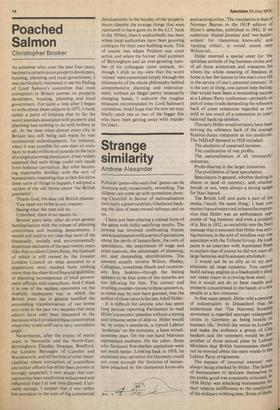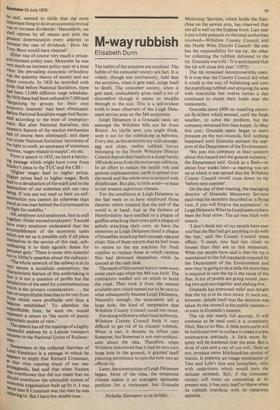Strange similarity
Andrew Alexander
Political 'guess-who-said-that' games can be diverting and, occasionally, rewarding. The diligent can come up with quotations showing Churchill in favour of nationalisation (not really a great surprise), Gladstone backing the idea of state-owned railways and so on.
I have just been playing a topical form of the game with richly satisfying results. The process has involved confronting friends and acquaintances with a series of quotations about the perils of laissez-faire, the evils of speculation, the importance of wage and price controls, the advantages of planning, etc, and demanding identifications. The answers usually involve Wilson, Healey, Callaghan, sometimes Heath and occasionally Roy Jenkins—though the feeling appears to be that some of the remarks are too left-wing for him. The correct and crushing counter-riposte to these answers is, as some may by now have guessed, that the author of these views is the late Adolf Hitler.
It is difficult for anyone who has spent long periods reporting Parliament to read Hitler's economic speeches without a strong and tiresome sense of déjà-vu. Hitler would be, by today's standards, a typical Labour 'moderate' on the economy, a keen mixedeconomy man. On the one hand Marxism represented madness. On the other, those who favoured free-market capitalism were not much better. Looking back in 1939, he explained that salvation for Germany could not come through the 'doctrine of laissezfaire preached by the clamorous know-alls
andcarping critics.' The translation is that of Norman Baynes in the OUP edition of Hitler's speeches, published in 1942. If we substitute 'dismal jimmies' and 'wet leaderwriters' for 'clamorous know-alls' and 'carping critics', it would sound very Wilson-ish.
Hitler reserved a special sneer for 'the spiritless attitude of big business circles and of all those aristocrats and wiseacres for whom the whole meaning of freedom at home is but the licence to live one's own life in the service of one's personal interests'. It is the sort of thing, one cannot help feeling, that would have been a resounding success at a Labour Party conference—probably as part of some tirade demanding the reference back of some composite regarded as too mild or too much of a concession to international banking opinion.
The early Hitler would certainly have been moving the reference back of the average Scanlon-Jones composite as too moderate. The NSDAP demand in 1928 included: The abolition of unearned incomes.
The confiscation of war profits.
The nationalisation of all 'monopoly' industries.
Profit-sharing in the larger industries. The prohibition of land speculation.
Speculators in general, whether dealing in shares or land or currency, and whether Jewish or not, were always a strong target for Nazi hatred.
The British Left and quite a part of the media ('much the same thing;' I hear you mutter) have always tried to leave the impression that Hitler was an enthusiastic suPporter of 'big business' and even a product of it. But in 1932, so socialistic was the Nazi message that it assumed that Hitler was antibig-business in the sort of mindless way one associates with the Tribune Group. He took pains in an interview with Associated Press to explain that of course he did not want all large factories and businesses abolished:
'I would not be so silly as to try and eliminate all large concerns. You cannot build railway engines in a blacksmith's shoP nor ocean liners in a rowing-boat shed . • but it would not do to have wealth and property concentrated in the hands of a few people or a few concerns.'
In that same speech, Hitler told a meeting of industrialists in Dilsseldorf that he understood that 'The National Socialist movement is regarded amongst widespread circles in Germany as being hostile t° business life.' Switch the venue to London and make the audience a group of city bankers and the comment would be just another of those annual pleas by Labour Ministers that British businessmen should not be worried about the mere words in the Labour Party programme.
The menace of 'personal interests' was always being attacked by Hitler. The failure of businessmen to dedicate themselves to the public good was constantly criticised. lo 1934 Hitler was attacking businessmen. for their relative indifference to the conditions of the ordinary working man. Some of their, he said, seemed to think that the most Important thing to do in an economic revival was to increase dividends : 'Henceforth, we shall oppose by all means and with the greatst determination every attempt to Increase the rate of dividends.' How Mr T°nY Benn would have cheered !
Hitler was of course very much a pricesand-incomes policy man. Moreover he was very much an incomes policy man at a time When the prevailing economic orthodoxy Was the quantity theory of money and not direct controls. In 1938 he recorded with Pride that before National Socialism, there had been 13,000 different wage schedules. BY 1938 these had been reduced to 7,000 and bargaining by groups for their own economic interests' had been eliminated. Before National Socialism wages had fluctuated according to the level of unemployment. But after National Socialism, this eccentric feature of the market mechanism had of course been eliminated ; and there Was under National Socialism 'assurance of the right to work, an assurance of minimum incomes, wages related to output', etc etc. From a speech in 1935, we have a hectoring Passage which might have come from nealey's pleas to the TUC and the CBI: ,.:Higher wages lead to higher prices. Higher prices lead to higher wages. Both lead to a devaluation of the mark and to the destruction of our existence and our very ,being, If you are not mad or bent on selfuestruction you cannot do otherwise than tand as one man behind the Government in its fight for stability.' All, employer and employees, had to pull together. Hitler warned employers : 'I would • have every employer understand that the accomplishment of the economic tasks which are set us is possible only if all place themselves in the service of this task, subordinating it to their egoistic desire for Personal gain.' There is some nice material tOo in Hitler's speeches about the railways: The whole network of the railway is in its very nature a socialistic conception; the characteristic feature of this undertaking is that it is not a question of profits but the satisfaction of the need for communications ,wluch is the primary consideration . . . the loS5 on unprofitable lines has to be met from tkhose which were profitable and thus a "alance established.' To abandon the imProfitable lines, he went on, would represent a return to 'the worst of purely capitalistic points of view.' The speech has all the makings of a highly successful address by a Labour transport
minister to the National Union of Railwaymen,
, Somewhere in the collected diatribes of Lord Vansittart is a passage in which he apPears to imply that Richard Crossman, at that time running much of our war proPaganda, had said that when Nazism !as overthrown that did not mean that we Should overthrow the admirable system of e_c°nomic organisation built up by it. I was !lever sure if Crossman was the man he was referring to. But I have few doubts now.



































 Previous page
Previous page